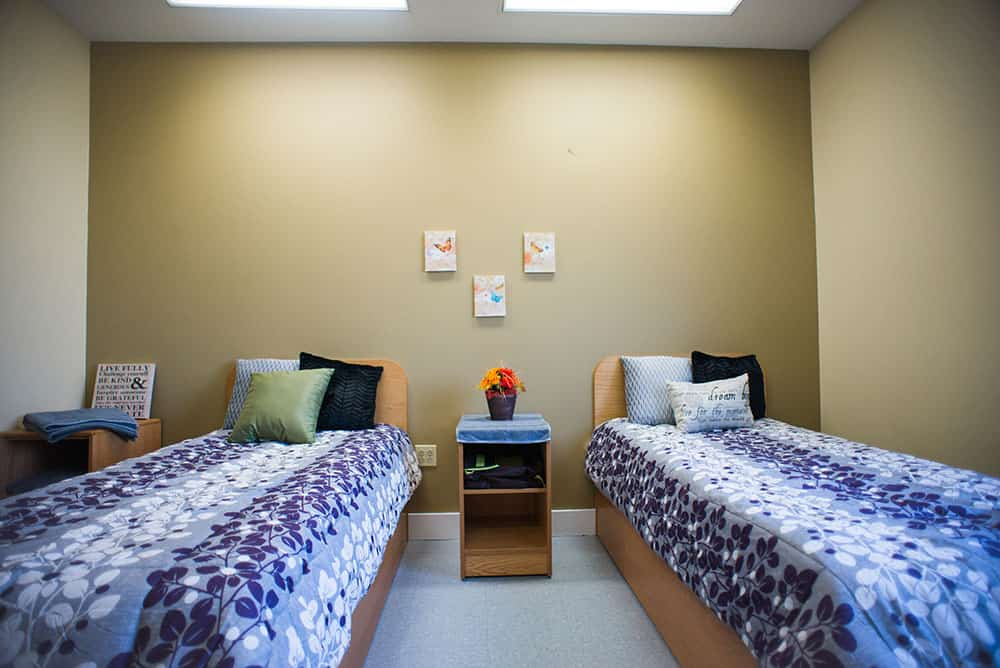Options Behavioral Health is renowned as one of Indianapolis’ leading providers of adjustment disorder treatment. Our expert staff creates personalized treatment plans to cater to each individual’s specific needs.
Adjustment Disorder Treatment
Learn more about adjustment disorder treatment at Options Behavioral Health System in Indianapolis, IN
Many things that happen in life require a period of adjustment, such as moving, getting a new job, starting a new school, losing a loved one, having a baby, or other similar life-changing events. While many people are able to deal with these adjustment periods with minimal turmoil, some will experience more severe emotional or behavioral disturbances in response to the stress they are experiencing. When this is the case, these individuals may be suffering from adjustment disorder, and may require professional care at a hospital or treatment center in order to gain control of their distressing symptoms.
At Options Behavioral Health, we have helped many people learn to manage, and ultimately overcome, the symptoms of adjustment disorder by offering state-of-the-art treatment that is provided by an experienced team of professionals. Options Behavioral Health is an 84-bed, free-standing psychiatric hospital devoted to providing a full continuum of care for adolescents, ages 12 to 18, adults, and older adults who are battling the symptoms of any number of mental health concerns, including adjustment disorder. At our hospital, individuals can learn the tools they need to successfully achieve a brighter future.
Types of Treatment
Types of adjustment disorder treatment offered at Options Behavioral Health System in Indianapolis, IN
At Options Behavioral Health, we offer various levels of programming at our center that are tailored to meet our patients’ specific needs. Our center’s 24-hour physician and nursing staffs are dedicated to not only getting to the cause of the presenting behavioral issues, but also to working with each patient and his or her family to educate them on the necessary steps they should take to prevent or cope with future issues.
The staff at Options Behavioral Health is committed to providing stabilization services to individuals who are in need of acute care to treat symptoms that have become exacerbated to the point that they are unable to continue functioning appropriately on a daily basis. When patients come to our hospital for the treatment of adjustment disorder symptoms, they can rest assured that all measures will be taken to alleviate the distress that they are experiencing so that they can move on to receive continuing care in a less restrictive environment.
In order to ensure that all of our center’s patients are provided with comprehensive care during their time spent at Options Behavioral Health, the following interventions may be implemented into each patient’s individualized treatment plan:
Medication management: Medication is not always used as part of the treatment for adjustment disorder. However, when there exists symptoms of a co-occurring disorder, medication may be used to help relieve some of those symptoms. The implementation of any medication at our hospital will be determined on a case-by-case basis depending upon each individual’s specific needs. Patients who participate in programming at Options Behavioral Health will meet individually with the psychiatrist or nurse practitioner five days each week at our center for medication management services.
Individualized therapy: Individualized therapy can be very useful for people who are struggling with adjustment disorder as it affords them an opportunity to discuss the ways in which adjustment disorder has affected their lives in an intimate setting. Our hospital’s patients are able to discuss possible causes for their depression, process through challenges that may arise while they are in treatment, and celebrate successes that they achieve.
Group therapy: Group therapy is one of the main types of treatment used in the treatment of adjustment disorder at Options Behavioral Health. Each day at our center, there are a number of different groups held, including one process group, two activity groups, and between two and four psychoeducation groups. The topics that are discussed and the activities that are partaken in during these group sessions can vary among the different age-specific programs, but may include the following:
- Creating Change
- Problem Formation / Solution
- Anger Management
- Healthy Relationships
- Coping Skills
- Goals Groups
- Identifying Patterns
- Power and Control
- Communication
- Trust and Respect
- Timalation
- Reminiscent Therapy
- Brain Games
- Arts and Crafts
- Exercise
- Current Events
- Discharge Planning
Family therapy: Family therapy sessions are designed to help patients and their family members explore the ways in which the presence of adjustment disorder symptoms has affected the family dynamic as a whole. It can also serve as a time to teach family members about adjustment disorder, recovery, and ongoing care, as well as to guide them in learning ways that they can best support their loved ones. Patients at our center will be afforded the opportunity to have at least one family therapy session during their time spent at Options Behavioral Health.
Experiential therapy: Experiential therapy opportunities are offered twice each day and are incorporated into the activity therapy groups that our center’s patients participate in. The different types of experiential therapies that patients may engage in include:
- Music Therapy
- Recreation Therapy
- Expressive Arts Therapy
Recognizing that ongoing care is often essential in facilitating lasting healing from adjustment disorder, the staff at Options Behavioral Health works diligently with patients to develop thorough discharge plans and arrange for aftercare supports. The therapists in each program within our hospital facilitate discharge and aftercare planning by assisting patients in scheduling follow-up outpatient therapy sessions within seven days of their discharge. When necessary, psychiatric appointments are also scheduled at the time of discharge. Therapists work with patients to assess what other types of resources and referrals may be beneficial in their specific situations and will help make those arrangements as well.










